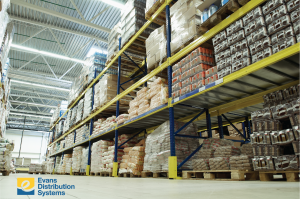Selecting a food-grade warehouse can be a challenge. The storage requirements can vary depending on

Dry Storage
A dry storage warehouse provides a clean, dry environment for foods such as canned foods, packaged snacks, or sauces. These warehouses will provide temperature-control for extreme changes such as preventing a product from freezing or melting, depending on the product. Dry storage must also account for humidity to prevent any damage or spoilage to the product.
Frozen Food Storage
Frozen food storage warehouses are designed to handle foods that require freezing for any reason. These warehouses must maintain a constant freezing temperature. Frozen foods maintain a longer shelf life but once the food thaws it will spoil much faster. Therefore, maintaining a freezing temperature point in the storage and shipping process is critical.
Refrigerated Storage
Some food products do not need to be frozen but will maintain a longer shelf life if kept at cooler temperatures. A refrigerated warehouse provides cold storage for foods and other products that need to be kept under a certain temperature. Produce and beverages are good examples of products that require refrigerated storage.
Inventory Turnover Rate
When storing products that have expiration dates, you want to ensure that the products don’t expire before reaching store shelves. That is why food products are shipped using the first-in-first-out (FIFO) method. The products that are produced first are sold first. This helps prevent spoilage of food products.
Building Upkeep
One of the most important factors in food-grade warehousing is the cleanliness of the building. It is imperative for food storage that the facility is clean and well maintained so it does not compromise the food. This requires regular cleaning and inspection of the warehouse.
Pest Control Plan
With food products, there runs a risk of pests or rodents to contaminate the food. The building should not have holes, cracks, or other ways for unwanted critters to enter. The property around the building should be well maintained to keep pests out of the building. The facility should have ongoing and proactive pest control throughout the property. Traps, chemicals and regular inspection by personnel is required.
FDA Approved
The quality of the operation, building, and staff play an important role in finding the right food-grade warehouse. Keep in mind that food-grade warehouses should be registered with the FDA and be subjected to regular local food safety inspections. FDA-approved facilities are required to have a written plan for preventing food contamination. They must also be up to date on all food storage regulations.
Evans Distribution Systems operates several food-grade facilities in the Metro Detroit area. Contact us today if you are interested in our food storage warehousing.
